The Marvelous Alex Borstein
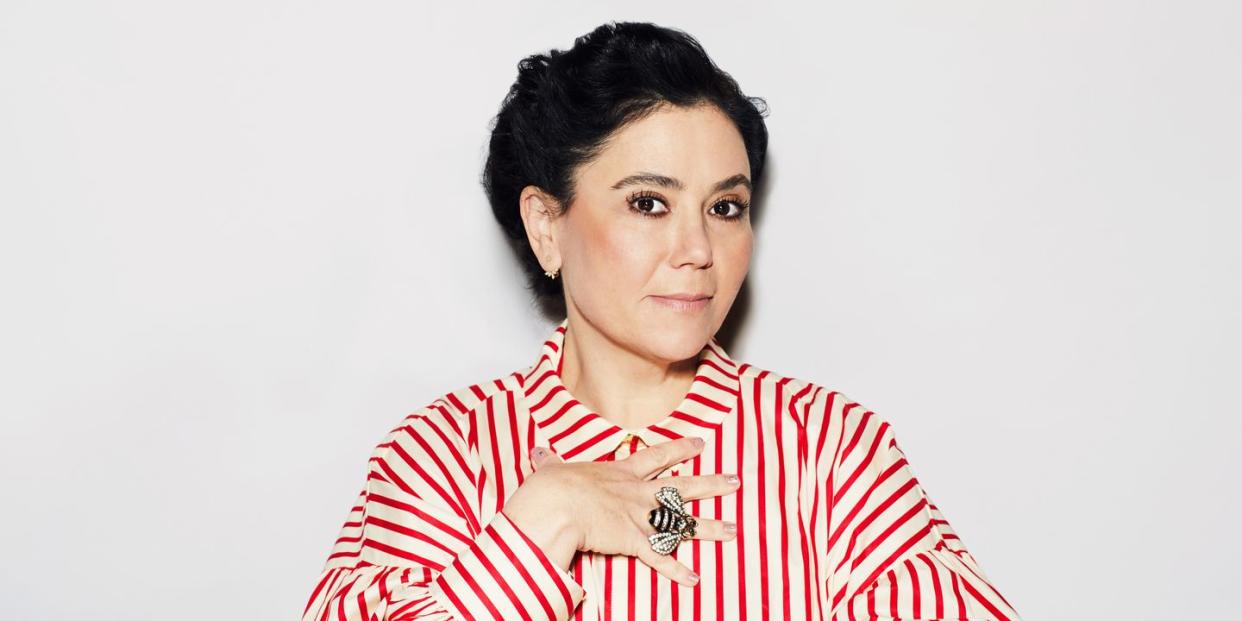
"I'm a pleasing asshole,” Alex Borstein says. The petite 47-year-old has just ever-so-pleasantly informed our brunch server that she actually ordered an egg white omelet, and that I had hoped to eat more than the small plate of bacon sitting in front of me. “I like to do things for people,” Borstein says, pushing up merlot sleeves to reveal a diamond tennis bracelet she bought herself. “But I have boundaries.”
Much of Borstein’s work lives in this territory between appealing and alienating. Her most famous role is voicing (and writing for) Lois Griffin, the animated matriarch on Family Guy, a show known equally for its huge audience and 17-year run and for the provocations of its creator, Seth “We Saw Your Boobs” McFarlane. On Amazon’s The Marvelous Mrs. Maisel, whose second season premiered December 5, Borstein plays Susie, the aggressively prickly manager of the aggressively winning titular character. On a show whose few detractors find its sweet charm treacly, Borstein is a pinch of salt.
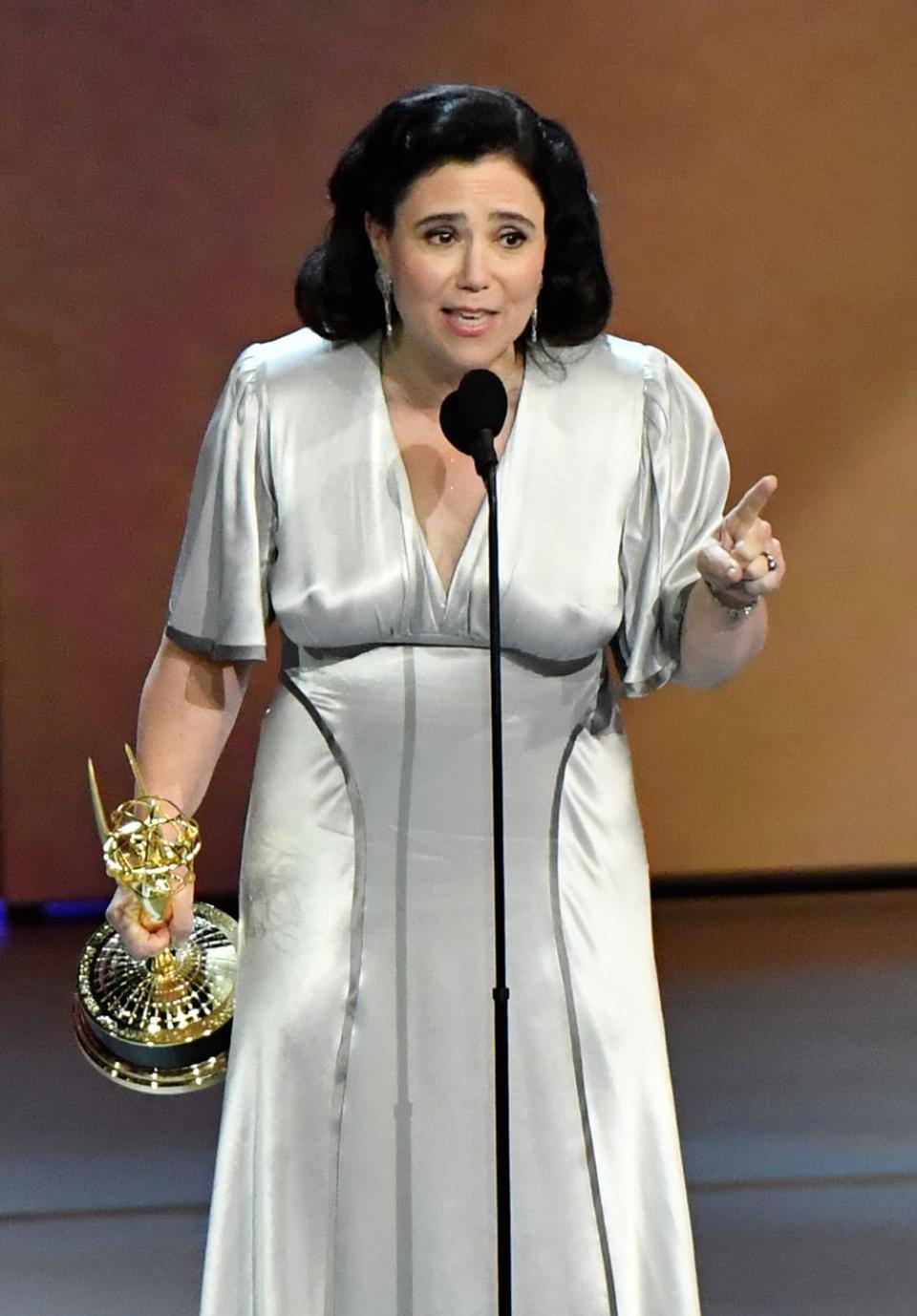
Then there was Borstein’s performance at the 2018 Emmy Awards, during which she accepted a Best Supporting Actress statue for her work on Maisel. Presenter Tracy Morgan called her name, and up stood the actress most often seen in Maisel’s frumpy Newsies tweed and as a Rhode Island-based cartoon mother. But Borstein unwrapped her cover-up, revealing a grey silk dress that registered somewhere between the boudoir attire of a glamorous recluse and what a starlet might wear to meet Howard Hughes. Glorious bosom freed, Borstein gave a jiggling shimmy. When she arrived onstage, she needlessly informed the crowd: “I went without the bra.” Then Borstein thanked her Holocaust survivor-turned-Los Angeles-based-confectioner-turned therapist mother in Hungarian, told Marvelous Mrs. Maisel creator Amy Sherman-Palladino “I love you and I hate you,” and used the platform to issue this PSA: “Ladies, when you use a public restroom, sit. If you sit, we can all sit.” If they gave out Emmys for Emmy acceptance speeches, Borstein would be back on stage again next year.
“It became such a thing,” Borstein says, exasperated that everyone made such a big deal about the fact that, well, we saw her boobs. “I'm over 45 and my tits have fed two kids. People are like, ‘Gross. Put a bra on. You should be ashamed.’ Whereas, if you're young and your tits are up, everyone's like, ‘Yeah. Bring it on.’ " I tell her that everyone I knew loved it-my Twitter timeline was a chorus of “Yassss, Alex.” Or as Midge Maisel portrayer Rachel Brosnahan puts it: “I was probably more excited for Alex than Alex was for herself! I was overwhelmed for her and overwhelmed by her stripping and also a little turned on. Now it’s an oft used gif.” Borstein is unmoved.
Borstein chose the outfit for ease, she says, not to elicit any kind of response. She had run out of time to shop, having traveled to the Emmys from the home in Barcelona where she lives with her aforementioned pair of children. “The dress was so soft,” Borstein says, squirming at the pleasure of memory in a way that makes me want to purchase some silk goods. “It feels, like, luxurious on your skin and your nipples.” And she knew she would look good in the gown because she’d worn it before: to her wedding with now-ex-husband, actor Jackson Douglas.
However fraught divorce can be-in her Emmy speech, Borstein thanked her father for being “the only man who has ever truly loved or taken care of me”-it wasn’t enough to taint the dress, or to keep Douglas from joining the rest of the family in Spain. After the 2015 cancellation of HBO’s nursing home tragi-comedy Getting On, on which she played head nurse Dawn Forchette, Borstein dreamed up the idea of becoming an ex-pat while writing a screenplay with a friend. The friend backed out, but Borstein made the move-with Douglas’s blessing. “I said, ‘I wanna do this, but I'd never take my kids away from their daddy.’ So I asked him, 'Would you be up for this?' And he was like, ‘It's interesting. Okay, let's try it...for a year.’”
The trial year began three years ago and coincided with another major life change: The Marvelous Mrs. Maisel. Sherman-Palladino had missed out on casting Borstein before, when she had to give up her role as Sookie St. James on Gilmore Girls to honor her contract at Mad TV-a show whose sensibility has not aged quite as belovedly as Gilmore Girls’. The part went to Melissa McCarthy-whose onscreen husband was played by Borstein’s real-life then-husband Douglas-and was still largely inspired by Borstein. She says, “We would tell stories at dinner with Amy [and her husband and creative partner Daniel Palladino] about what's going on in our lives and then we'd see it between Sookie and Jackson on Gilmore Girls and go, ‘You fucker.’” The confluence of timing of the move to Spain and the Maisel role is why Borstein says, “I love Amy and love this opportunity and this part. And I hate her, because it's now like, how do I do this?”
“She was about to move when they picked up the pilot,” Sherman-Palladino confirms. “I knew this. I did not tell her about the part until they picked it up. So when I called her about it, knowing she was sitting there surround by boxes learning Catalan, I asked if she wanted me to not send her the script. That way, no temptation. So I’m on record-I offered her an out. I wrote it for her. I knew if she read it she’d want to do it. So I guess I earned the ‘hate.’ As long as the ‘love’ is there. too, I’m good.”
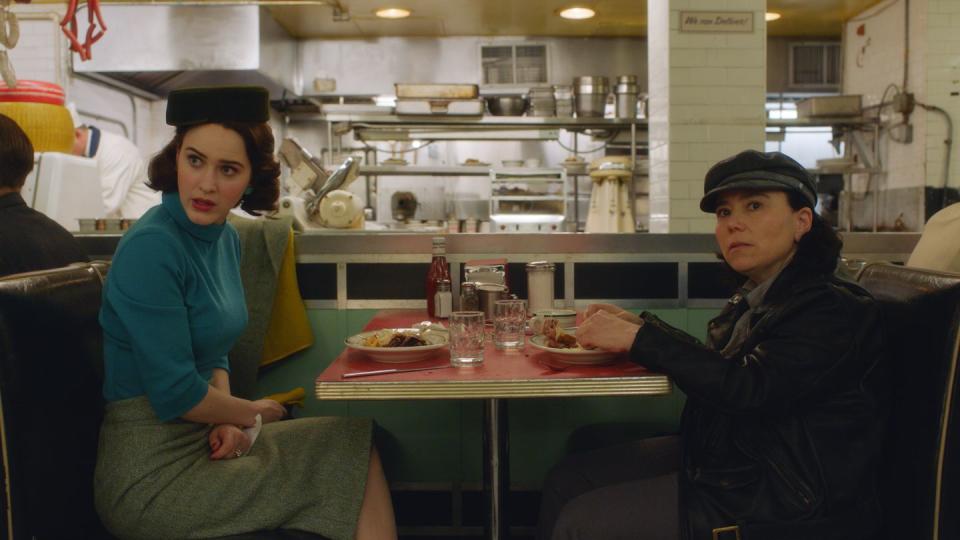
Here’s how Borstein does it: by flying to New York during Maisel’s shooting season and spending three or four days playing brash Susie, the part Sherman-Palladino wrote for her and consequently has “a lot of Alex in there,” as Borstein says. Then she goes back to Spain and is fully Alex. In Barcelona, Borstein walks the kids to school and takes daily siestas. She joined a local improv group, which is a bit like LeBron James deciding to relax by signing up for rec league basketball in the off season.
Borstein began noticing patterns in her fellow improvisers. French students tended to be physical. German students were precise with their language. And the Americans? “We tend to be very emotionally driven in their choices,” Borstein says, professorially pushing cream tortoiseshell glasses up her tiny nose. “‘Like me. Like my joke.’ We think our brains are so unique and that we're coming up with all of these ideas, but we're hardwired.”
Seeing herself as a person very like others-and enjoying the sensation-was a revelation for Borstein, who grew up defining herself by what she wasn’t. “My grandmother and mother were queen and princess,” Borstein says. “I was a squire. My mom and my grandma would say things like, ‘You looked terrible, what are you doing?’” She does not sound bitter about this at all. “It made me quick and sharp,” she says. “And I knew all the while they would walk through fire for me.” (It may have also helped that her mother has purchased Borstein some extremely beautiful jewelry, which she shows off at my request.) “Growing up with my mom being so glamorous and very feminine and lovely and sexy certainly made me go like, oh, that role’s already filled,” Borstein says. Then she looked at her older brothers and thought, “This one’s already the oldest, this one’s got hemophilia...what can I do? What's my role?”
Her brother’s blood clotting disorder pushed Borstein into her niche. “I was always trying to provide comic relief when there were medical emergencies,” she says. “We were in and out of hospitals with my brother a lot, and my role was to be silly and goofy. We used to have wheelchair races down the hallways to cheer him up. You take that role on and it becomes a little piece of who you are.” Or, your entire career.
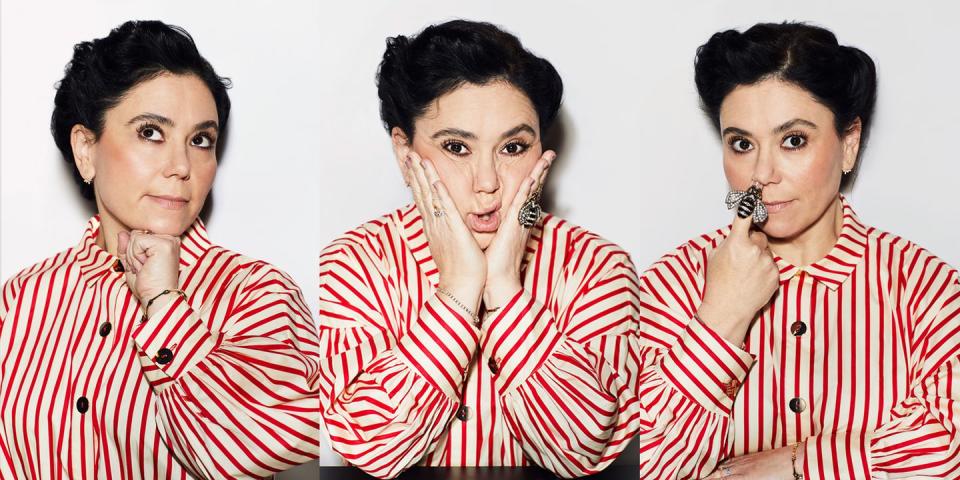
Borstein has finished her replacement omelet, so we leave brunch to head to a bookstore. Although it is, in meteorological terms, fucking freezing, Borstein is not wearing her coat. “I have to put it on after I go outside,” she says. “I feel like my body should know what the temperature is outside before I affect it otherwise.”
For someone who chose an Emmy ensemble based on comfort, this embrace of unpleasantness seems like an odd move. But as we walk past the Trump Tower and an office where Borstein is pleased to let me know she got her “butthole lasered,” she explains that the dress was a coping strategy for having to show up on the red carpet at all. “I spent so long going to red carpets where nobody has known who I am or wanted to talk to me,” she says. “I'm asking a photographer, ‘Which way should I stand that looks good? Please tell me if something hangs out.’ And they're all just asking the same questions. It doesn't feel like there's much honesty in it.”
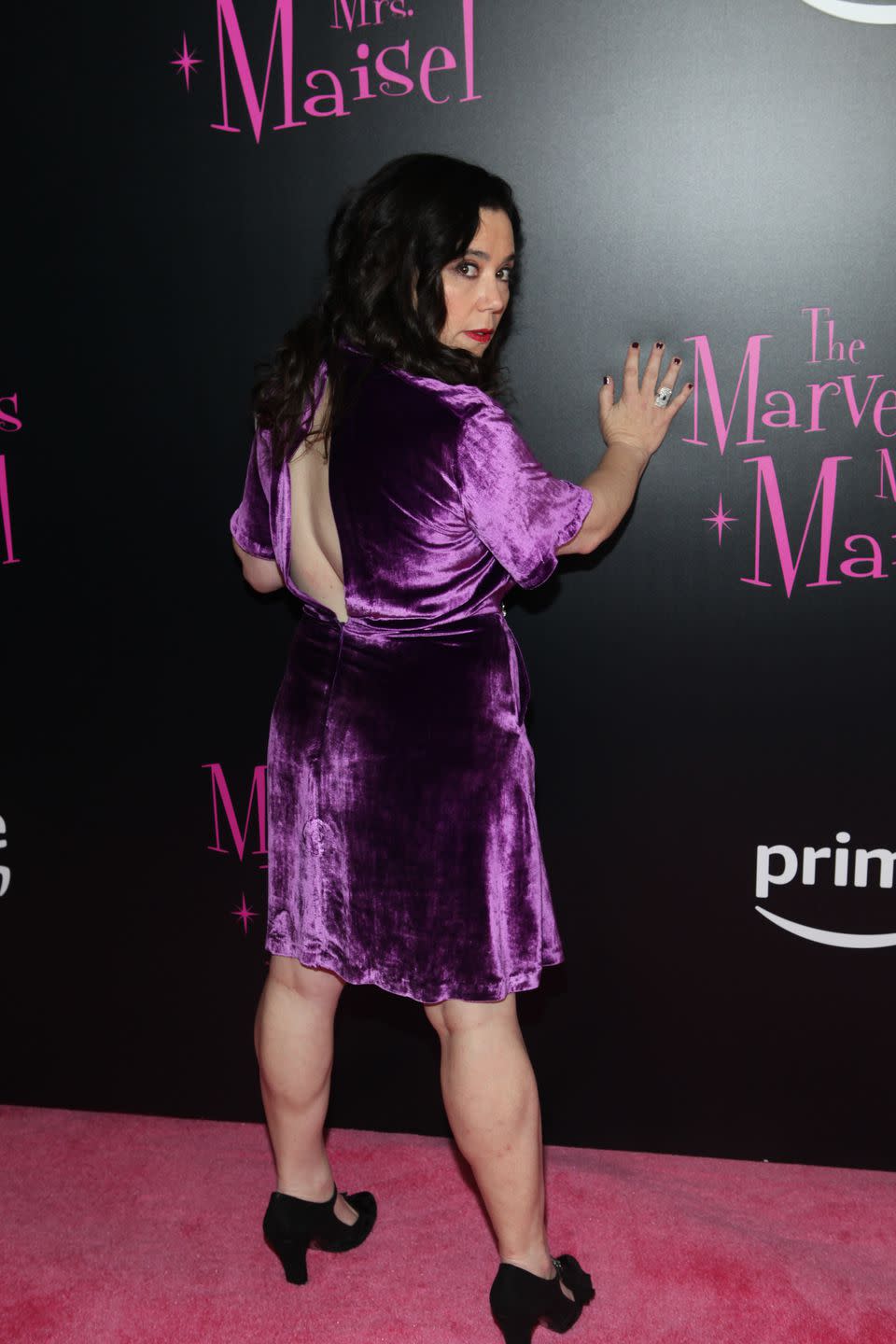
Borstein has played the role of the red carpet interviewer herself, alongside her Emmy date Will Sasso for Mad TV. They took a more aggressive approach when, during the apex of Ally McBeal’s success, they interviewed Calista Flockhart. “She was on every magazine cover,” Borstein remembers. “She came over and was cautious. I said, ‘A lot of assholes here tonight.’ And she goes, ‘I think I found the assholes. You guys made fun of me on Mad TV, didn't you?’”
Borstein cackles. She loves that. That was real.
At the rare book shop, we are escorted to the first edition room by a young man who says a series of increasingly unsubtle things to let Borstein know he’s aware of who she is. She ignores the overtures and asks for his help finding a collection of plays by Harold Pinter, which she just flew to London to see performed. Borstein tells me the story of Pinter’s The Lover: A man and a woman say good-bye to each other and he heads off to work. "What will you do today?" the husband asks. "Oh, I think my lover will be here today," she tells him. Then the same actor playing the husband changes his clothes and comes back, now as her lover. Eventually, the husband becomes jealous of his other persona. “We have such hedonistic adaptation that we can't be happy in one form,” Borstein says. “And we create this other one to the point of becoming jealous of our own doings.”
There’s one more thing Borstein wants to check out. “I’m a time travel fan,” she tells me as she futilely searches for the copy of H.G. Wells’s The Time Machine it turns out the shop just sold to someone else. “And I like to think about alternate universes.” Because she has regrets? Because she wants to go back and do things differently?
No. “I would love the opportunity of lifetime of firsts, and you could do that if you have a separate universe to start at,” Borstein says, holding her first edition copy of a play about a person who isn’t able to reconcile the different parts of himself. “That’s why I wanted Barcelona. I found my parallel universe. I get to find new loves and I'm becoming a new type of mother and I've learned to cook new things. I'm creating a million firsts.”
('You Might Also Like',)

